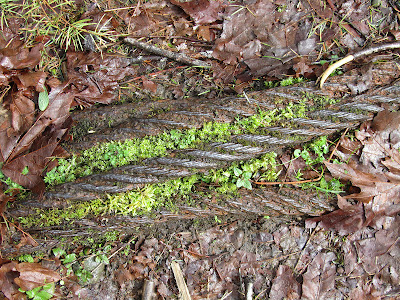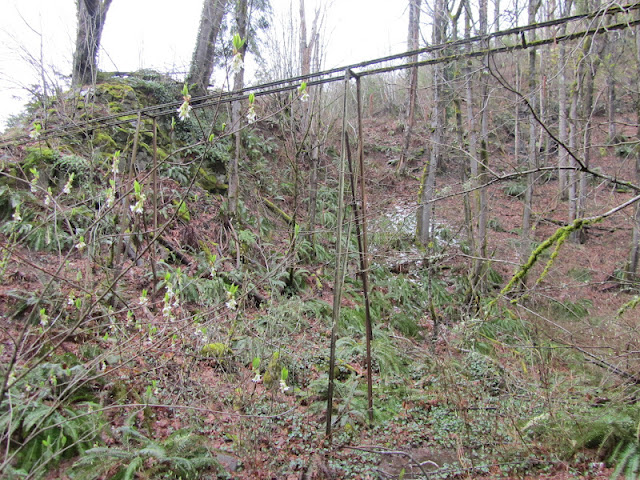The town of Franklin, a coal mining community, started out in the 1800’s and apparently the population grew to around 1000 in its hayday. It died out around 1915. When we arrived up the hill from the Green River, we were first greeted by a coal cart.
We then went on past a variety of old foundations of stone, and one with brick as well.
We passed the edge of any sign of town and wandered around the East side of the hill. There we saw a red breasted sapsucker hard at work. We enjoyed the birds, the walk, and some interesting thistles, and then headed back toward where the town had been.
The sign said a cemetery lay the opposite direction, so we headed that way. Rusty metal relics and more foundations of some kind stuck out here and there alongside the dirt road. Hundreds of signs of civilizations could have been right under our noses and feet. The entire area was blanketed with layers of blackberry vines and run-away English ivy.
Suddenly the path opened up on a flat area with a fence around something and we were treated to an amazing testament to the industriousness of men. It’s one of the coal mine shafts, covered quite securely (thank goodness) with two layers of metal grate. The shaft travels over 1300 feet below where we were standing, and reached from the top of the hill that held us in the misty sky, to 500 ft below the level of the sea. We pictured a straight shaft following a column of coal down until later when we read more about the structure of a coal mine and then realized that there would be a network of tunnels stretching out at different layers below, with cross-tunnels to surround “pillars” of coal and then mine it out from various sides. There were gangways, slopes, air shafts and various other anatomy of a mine I had not looked into before. Sadly, one of the things that piqued our curiosity about this particular mine was a horrific accident in which a fire breaking out far below killed 37 miners. The youngest was only 16 we read later, and sold peanuts at a Seattle theater. He was affectionately known as “Peg” due to the fact that he had a peg leg. Among the other deaths that day, a father and son lost their lives in the fire, finding each other in the smoke, and succumbing together. The tragedy and sorrow, so human and so shocking, abruptly brought 1894 into our today.
After marveling over the dark and shivery depth of the shaft, we continued on along the path through the woods toward the cemetery. Along the way, Dave would notice areas that didn’t fit with the natural terrain and we would look at deep grooves that may have been tracks or collapsed tunnels. At one area, which it looked like was a shallow mining operation, scooped out of the hill, he found this awesome trestle. We thought it was a cute little ore cart track, but later learned it supported the town's water supply pipe.
He took game trails on, and Cedar and I went back to the main path. We came upon the cemetery suddenly, as after all that time it was no longer the patch of cleared ground it probably once was. It was a thick jungle of fallen trees, blackberry vines, and English ivy. It looked like a forest of century-old daffodils were starting to come up through it all. And among the overgrown undergrowth, there were headstones. They were scattered and leaning, and left no doubt that they were just the ones that were found, and under the fallen trees and persistent vines, there were others. James Gibson, brother of Romulous, was one of the men who died in the mine fire. I was surprised at the ages I saw, 27, 35, 30… until I got home and looked closer and then saw that many of the headstones were those of children and infants. What an incredibly difficult and tenuous thing life was then. We are luckier than we know to have the benefits we have now.
After looking around the cemetery we had our lunch on an old foundation. Dave picked up a mossy stone and found a Western red-backed salamander! : )
After we had thoroughly explored the area (although we would like to do more), we got back into the car to check out the one-lane road that crosses the Green River. Dave had asked some kayakers where they put in at and we were interested in seeing that too, so we drove out to the Kanasket-Palmer State Park and checked out the Green River. Cedar had gotten incredibly muddy running around in the ghost of Franklin town, so Dave gave him a rinse.
What an incredible day. I strongly encourage you to get out to this nearly-lost historical site, and also to read about its history. A subject that was always difficult for me in school is fascinating to me when it comes to life.













































Wow, very interesting site. Graveyards are always rather creepy to me, especially older ones that hold so many infants and young people. It was definitely hard times back then. Cool story!
ReplyDelete